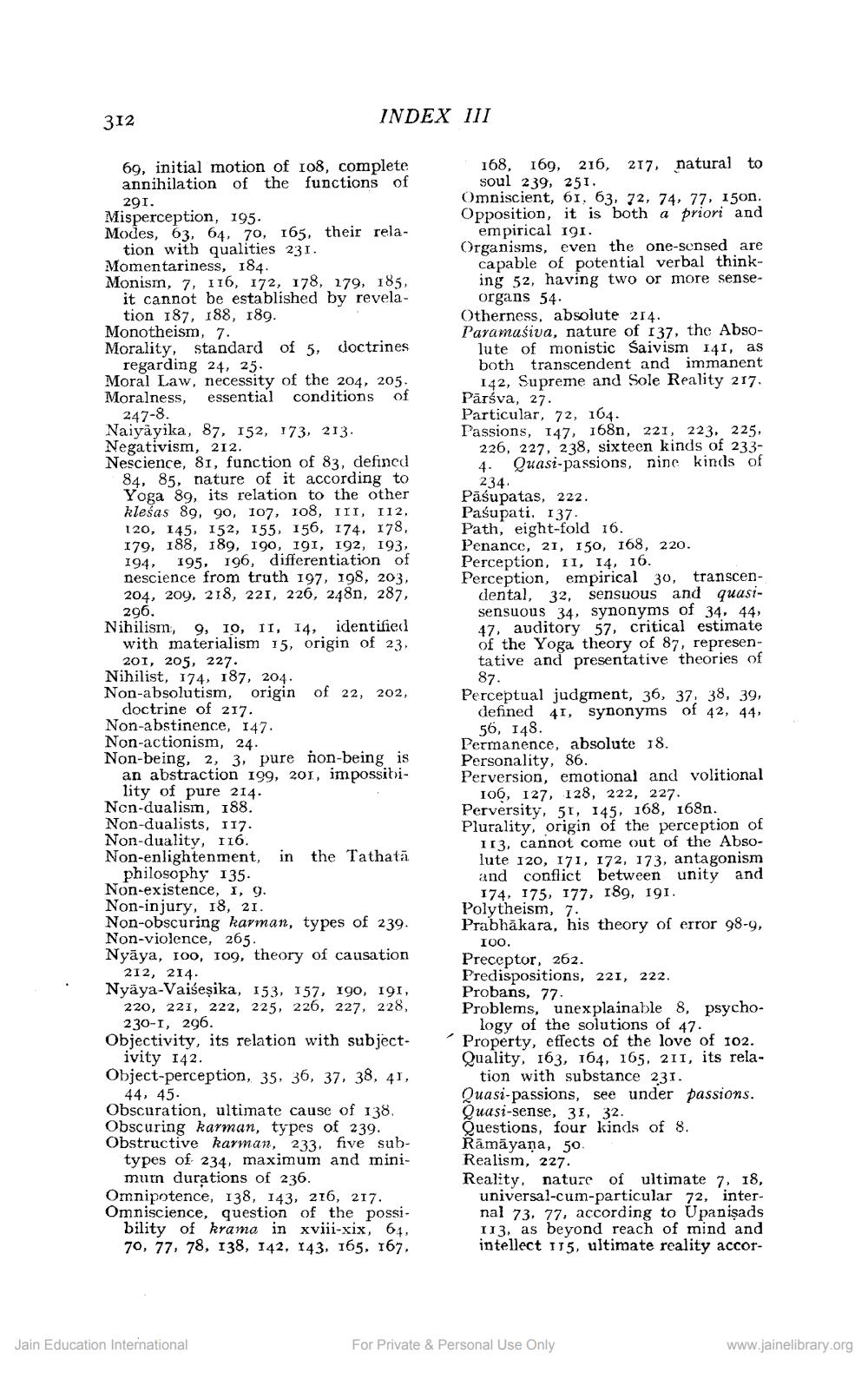________________
312
INDEX III
69, initial motion of 108, complete annihilation of the functions of
291. Misperception, 195. Modes, 63, 64, 70, 165, their rela
tion with qualities 231. Momentariness, 184. Monism, 7, 116, 172, 178, 179, 185,
it cannot be established by revela
tion 187, 188, 189. Monotheism, 7. Morality, standard of 5, doctrines
regarding 24, 25. Moral Law, necessity of the 204, 205. Moralness, essential conditions of
247-8. Naiyayika, 87, 152, 173, 213. Negativism, 212. Nescience, 81, function of 83, defined
84, 85, nature of it according to Yoga 89, its relation to the other klešas 89, 90, 107, 108, III, 112. 120, 145, 152, 155, 156, 174, 178, 179, 188, 189, 190, 191, 192, 193, 194, 195, 196, differentiation of nescience from truth 197, 198, 203, 204, 209, 218, 221, 226, 248n, 287,
296. Nihilism, 9, 10, 11, 14, identified with materialism 15, origin of 23,
201, 205, 227. Nihilist, 174, 187, 204. Non-absolutism, origin of 22, 202,
doctrine of 217. Non-abstinence, 147. Non-actionism, 24. Non-being, 2, 3, pure non-being is
an abstraction 199, 200, impossibi
lity of pure 214. Non-dualism, 188. Non-dualists, 117. Non-duality, 116. Non-enlightenment, in the Tathatā
philosophy 135. Non-existence, I, 9. Non-injury, 18, 21. Non-obscuring karman, types of 239. Non-violence, 265 Nyāya, 100, 109, theory of causation
212, 214. Nyāya-Vaiseșika, 153, 157, 190, 191,
220, 221, 222, 225, 226, 227, 228,
230-I, 296. Objectivity, its relation with subject
ivity 142. Object-perception, 35, 36, 37, 38, 41,
44, 45 Obscuration, ultimate cause of 138. Obscuring karman, types of 239. Obstructive karman, 233, five sub
types of 234, maximum and mini
mur durations of 236. Omnipotence, 138, 143, 216, 217. Omniscience, question of the possi
bility of krama in xviii-xix, 64, 70, 77, 78, 138, 142, 143, 165, 167,
168, 169, 216, 217, natural to
soul 239, 251. Omniscient, 61, 63, 72, 74, 77, 150n. Opposition, it is both a priori and
empirical 191. Organisms, even the one-sensed are
capable of potential verbal thinking 52, having two or more sense
organs 54. Otherness, absolute 214. Paramuśiva, nature of 137, the Abso
lute of monistic Saivism 141, as both transcendent and immanent
142, Supreme and Sole Reality 217. Pārsva, 27. Particular, 72, 164. Passions, 147, 168n, 221, 223, 225,
226, 227, 238, sixteen kinds of 2334. Quasi-passions, nine kinds of
234 Pāśupatas, 222. Pasupati. 137. Path, eight-fold 16. Penance, 21, 150, 168, 220. Perception, 11, 14, 16. Perception, empirical 30, transcen
dental, 32, sensuous and quasisensuous 34, synonyms of 34, 44, 47. auditory 57, critical estimate of the Yoga theory of 87, representative and presentative theories of
87. Perceptual judgment, 36, 37, 38, 39,
defined 41, Synonyms of 42, 44,
56, 148. Permanence, absolute 18. Personality, 86. Perversion, emotional and volitional
106, 127, 128, 222, 227. Perversity, 51, 145, 168, 168n. Plurality, origin of the perception of
113, cannot come out of the Absolute 120, 171, 172, 173, antagonism and conflict between unity and
174, 175, 177, 189, 191. Polytheism, 7. Prabhākara, his theory of error 98-9,
100. Preceptor, 262. Predispositions, 221, 222. Probans, 77. Problems, unexplainable 8, psycho
logy of the solutions of 47. Property, effects of the love of 102. Quality, 163, 164, 165. 211, its rela
tion with substance 231. Quasi-passions, see under passions. Quasi-sense, 31, 32 Questions, four kinds of 8. Rāmāyana, 50. Realism, 227. Reality. nature of ultimate 7, 18,
universal-cum-particular 72, internal 73, 77, according to Upanişads 113, as beyond reach of mind and intellect 175, ultimate reality accor
Jain Education International
For Private & Personal Use Only
www.jainelibrary.org




